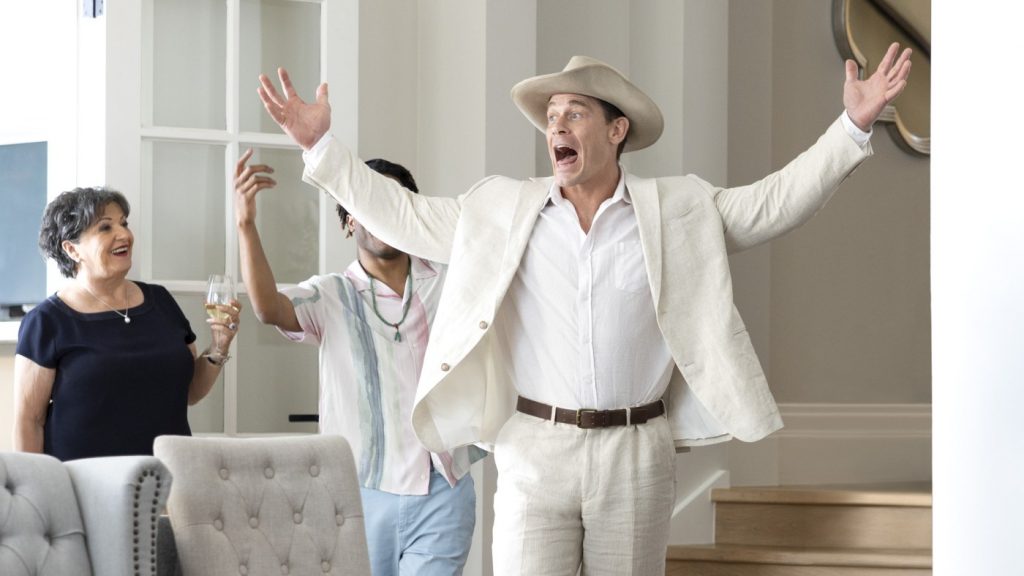For writer-director Peter Farrelly, it was love at first laugh when he read the screenplay for “Ricky Stanicky,” his new R-rated comedy starring John Cena and Zac Efron.
That it took more than a decade to get it made? Eh, that’s just Hollywood, the Oscar-winning filmmaker says.
“I’m used to it,” says Farrelly, who won Academy Awards for best picture and best original screenplay for “Green Book” in 2019. “Like, ‘Dumb and Dumber’ took five years. ‘Something About Mary’ took 10 years. ‘Kingpin’ was an old script.
“It takes a while until things are perfect, and hopefully this script got better and better and better,” he says. “I think in the last two years the script got elevated. It finally was ready.”
In “Ricky Stanicky,” which arrives on Prime Video on Thursday, March 7, the title character doesn’t actually exist. Since boyhood, three close friends played by Zac Efron, Andrew Santino and Jermaine Fowler, have blamed the imaginary Ricky Stanicky for whatever scrapes they got into. As adults, Ricky’s been their excuse to skip out on wives, partners, friends and colleagues.
But when the boys leave town for a few days to visit Atlantic City – poor Ricky Stanicky is hospitalized with cancer! – and Santino’s pregnant wife goes into labor weeks early, suspicions arise.
In one of those it’s-so-crazy-it-just-might-work ideas, the guys hire Rock Hard Rod, a failed actor played by John Cena, whom they’d met doing an R-rated musical cabaret in New Jersey, to show up as Ricky. And he’s great – people love Ricky. The only problem? Rod doesn’t want to stop being Ricky, and now the lads have an entirely different problem on their hands.
In an interview edited for length and clarity, Farrelly talked about casting Cena and Efron as his leads, what audiences need in order to love characters who do bad things, the 30th anniversary of his debut movie “Dumb and Dumber,” and the resurrection of his overlooked TV series “Loudermilk” on Netflix this year.
Q: What was it about this screenplay that made you go, ‘Oh, yeah, that’s a movie for me’?
A: I guess it came to me like 15 years ago, maybe more. It came through John Jacobs, a producer. And it was written by Jeff Bushell, the draft I read. I felt like it was completely original, this concept of making up a character that you blame things on.
Q: The idea of a friend, imaginary or otherwise, you can blame your misdeeds on is something most of us can identify with. Is that something you recall from your own life?
A: Yes, absolutely. But it wasn’t an imaginary person. It would be like my mom would say, ‘Where did you get the beer?’
‘Rob got it.’
‘Well, don’t hang around with Rob!’
It was that kind of thing. But the interesting thing about this for me now, and the reason I think the script got better, is because now we’ve analyzed it: ‘Well, why are they lying? Why do people lie?’ People lie for a lot of reasons. Insecure. Fear. And to analyze that, after showing what is happening, I think it makes the movie better because it’s not just a bunch of guys running around telling lies.
Q: Yeah, I kind of didn’t like them at first until I got to know them better. Like, why are they doing this to their wives and partners?
A: My wife, who’s my best reader – I always trust her instincts – she’s always said, ‘You know, there’s something missing here. These guys are like’ – can I swear here? – ‘these guys are (jerks).’ I asked her, ‘Well, why?’
‘Because they’re lying – and for nothing.’
‘I’m like, ‘Well, they have their reasons.’ And then finally, we’re like, ‘Well, what are their reasons?’ When you analyze it, it doesn’t make it forgivable, but it makes it more understandable.
Q: John Cena is great in this. How’d you pick him to be your Ricky?
A: ‘Peacemaker.’ Someone said, ‘Have you seen “Peacemaker”? Watch the guy in “Peacemaker.” You’re not going to believe how good he is.’ I thought I’d watch an episode. I ended up watching a bunch of them.
And I was just astounded at his courage as an actor, and how funny he was, and how committed. He does a lot of really crazy things in that show, and as soon as I saw it, I was like, ‘That’s Stanicky.’ He’s world-class funny in this.
Q: And Zac Efron, you worked with him on ‘The Greatest Beer Run Ever,’ but what made you pick him for your straight man here?
A: I would call it the leading man. He’s the guy in the middle. He’s, to me, like Tony Curtis in ‘Some Like It Hot,’ where Jack Lemmon is Andrew Santino and Jermaine Fowler. Those guys are the comic team. But he’s the leading man. He’s the guy who, if you don’t have that guy, it all falls apart. You need him.
And this, to me, is kind of his first real leading man role where he is carrying it in an old-fashioned, you know, Tony Curtis, Rock Hudson, Cary Grant kind of way.
Q: This movie has sort of been billed as a return to the kind of raunchy R-rated comedies you and your brother Bobby got your start with. Do you see it that way?
A: There are certain similarities, definitely. It’s an R-rated comedy, and we did go for it. But it wasn’t an attempt to like, ‘Oh, let’s go back to that.’ None of my movies have been an attempt. It’s just the one that comes to me at that moment.
Q: With an R-rated comedy, what have you discovered over the years is necessary to make it more than a collection of outrageous or crude moments that shock people? How do you balance that stuff?
A: It always comes from the characters. If you like the characters enough, you get away with murder. And, you know, there are parts in this thing early on where you don’t like the characters. But when you learn more about them you start to like them. And you have to do that or else we can’t do what we do.
I remember, and I’ve told this story a lot, but in ‘Dumb and Dumber,’ before they go to Aspen, Jim Carrey looks at Jeff Daniels, who doesn’t want to go. He says, ‘C’mon, I don’t have anybody. I don’t have anything,” and he plays it completely straight, Jim Carrey, and he actually wells up.
And I remember the next day, the studio called me. They got the dailies. They say, ‘What the hell are you doing? This is all dramatic. This (movie) is a comedy.’ I was like, ‘Well, dude, the guy selling a dead bird to a blind kid in a wheelchair, you better like him or the movie will end at that moment.’ And that’s how I always feel. If you like the characters, you can get away with a lot more.
If you feel like the heart’s in the right place, you can get away with a ton. If there’s something in them that (audiences) like, and they’re trusting, then you can get away with it.
Q: This year is the 30th anniversary of ‘Dumb and Dumber,’ which has become a kind of iconic comedy. I’m curious what you thought you had with that film before audiences embraced it as they have.
A: I thought it was hysterical, honestly, for years and it wasn’t getting made. I just remember thinking, ‘They’re wrong, I’m right.’ I felt that and my brother, too, and Bennett Yellin, who we wrote it with.
I had a roommate back then, like 33 years ago, who would come home at night, at like two in the morning. He’d bring home five, six people, and he’d say, ‘Hey, read your script.’ And they would literally, like, be sitting there smoking weed, and I would read them the entire movie from beginning to end. And I’d have them on the ground, like howling. They would be laughing their butts off. And that’s hard to do with a script.
He would always be coming in, like, ‘Dude, come on, man. Please?’ So I do it. I just had the utmost confidence that the script was good and eventually it would get made.
Q: When people talk to you about ‘Dumb and Dumber’ today, what do they say about why they love it so much?
A: They just like the characters. The love that the two guys had for each other. And they did, by the way. Jeff Daniels and Jim love each other. They were very close.
Jim, you know, is one kind of guy. He wants, he needs a lot of attention as an actor, as a human being. And Jeff’s the exact opposite. He just wants to sit there and be left alone. I would sometimes go over to Jeff and say, ‘Hey, I hope you don’t think I’m not giving you enough time.’ And he’d go, ‘No, no, no, don’t worry about it. Just take care of Jim.’
There’s really a sweetness to them that I think people like.
Related Articles
Kate Middleton ‘doesn’t need the stress’ of ‘black-sheep’ uncle’s reality TV gig
Iris Apfel dies at 102; fashion icon was known for colorful outfits and round black glasses
‘Nightmare’: How Prince Harry and Meghan Markle burned bridges in Hollywood
Oscars 2024: Who will win? Who should win?
Sydney Sweeney laughs off rumors she lied about working as Universal Studios tour guide
Q: I also want to ask you about ‘Loudermilk,’ which people on my social media have been raving about since it went on Netflix in January, and wondering how they never knew it existed before.
A: It’s been spectacular. It’s one of the nicest surprises of my career because I love that show. We did three years at the Audience Network, which no longer exists. But to the Audience Network’s credit, they said, ‘We want to do your show. We don’t have any dough, but you can do whatever you want.’ And we did.
They gave us notes like any network would but they were great notes or no notes, and we were able to do anything we wanted. I think if we had been anywhere else, it would just be, ‘You can’t tell that joke. Don’t do this. Don’t do that. And be careful how you do this.’
What’s great about (its return) is, this is the first time I’ve ever checked Twitter or X and nobody’s offended. Zero people. And we’re going after everybody (in “Loudermilk”). There’s all sorts of things that you would think people would flip out about, but they don’t, because I think the show’s heart is in such a good place.
Ron Livingston is such a flawed character who means well, and he’s the center of this thing. I’m so grateful to Netflix for picking it up and we want to do two more seasons at least.
Q: I just heard that. So Ron Livingston and the rest of the cast is coming back?
A: Oh, yeah, everybody. It actually ended at the perfect time to have a three-year gap. He sold his book at the end of the last episode of season three. So what happens now, we cut three years later and he’s back on top. His book was a huge hit. It’s a success. And now Ron, who used to be this high-flying guy who wrote for Rolling Stone, is back writing for Rolling Stone, and he’s hanging around, having lunch with Neil Young. And yet he’s got this group that he’s got to deal with.
And it becomes almost like a ‘Loudermilk’ meets ‘The Larry Sanders Show.’ It’s the slippery slope of fame, and how is it all gonna work? That’s the whole thing we’ve been planning for it since the beginning. So this is where it really gets good.


